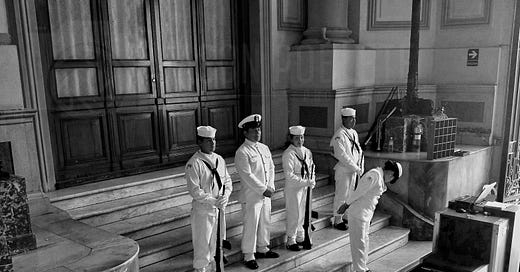During a trip to Peru about fourteen years ago, I witnessed the stark reality of a nation grappling with its past and present, caught in the crossfire of ideologies, poverty, and the struggle for security. It was a trip funded by a U.S. NGO, likely with government support, as part of a democracy-building project. I was tasked with providing a series of talks to parliamentarians and their staff about improving democratic institutions, specifically their Congress.
The photograph in this post is tied back to that trip, which was taken at the Peruvian Congress, where the meetings were held. One thing that struck me as odd was the Peruvian Senate hall. The Peruvian Congress building in Lima is approximately 120 years old, inaugurated in 1904, and is one of the country’s most historic government structures. The building has been the site of numerous significant political events in Peru’s history.
The Senate of Peru is no longer in use because of a 1993 constitutional change. During Alberto Fujimori’s presidency, a new constitution was enacted, establishing a unicameral (single-chamber) legislature, and eliminating the bicameral system that included both a Senate and a Chamber of Deputies. The current Congress of the Republic of Peru now serves as the sole legislative body. Perhaps in a future post, I’ll share more about how the shift to a unicameral legislature came about.
Fujimori remains a larger-than-life political figure in Peruvian politics, but I did not talk much about their politics. Beloved by millions, despised by probably the same number, the 1992 Fujimori *autogolpe*, supported by his party coalition, gave rise to a unicameral legislature as part of broader reforms to streamline government operations and consolidate power. Yet, streamlining government operations was a constant theme of my talks that focused on less government, more liberty, and, of course, law and order.
Keep reading with a 7-day free trial
Subscribe to The Poblete Dispatches to keep reading this post and get 7 days of free access to the full post archives.




